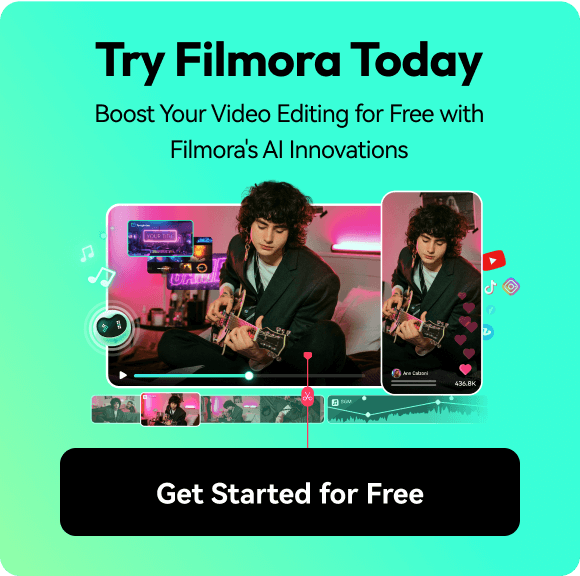Video editing has transformed dramatically from its early days. Today's editing software relies on nonlinear video editing, a modern system that gives creators unprecedented flexibility and control.
Unlike older linear methods, nonlinear video editing is non-destructive: you can edit any part of your project in any order without altering the original files. This means you can rearrange clips, make quick corrections, and experiment endlessly, which is why non-linear editing has become the industry standard.
This article covers everything you need to know about nonlinear video editing software. You'll learn how the system works, discover its key advantages over traditional editing, and understand why it's essential for modern video production.
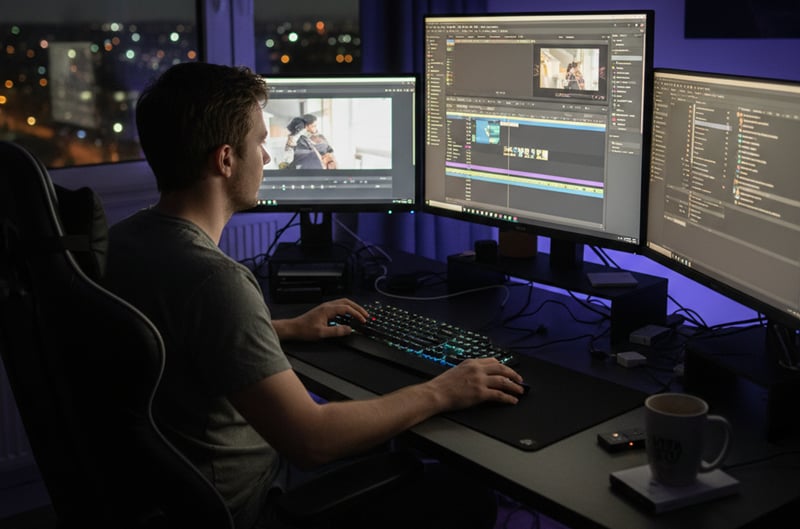
Part 1. What is Non-Linear Video Editing (NLE) Compared to Linear Video Editing
Non-linear video editing (NLE) has revolutionized modern video production, completely replacing traditional linear editing methods. NLE allows you to access and edit any frame, clip, or section of your footage in any order without affecting the rest of the project.
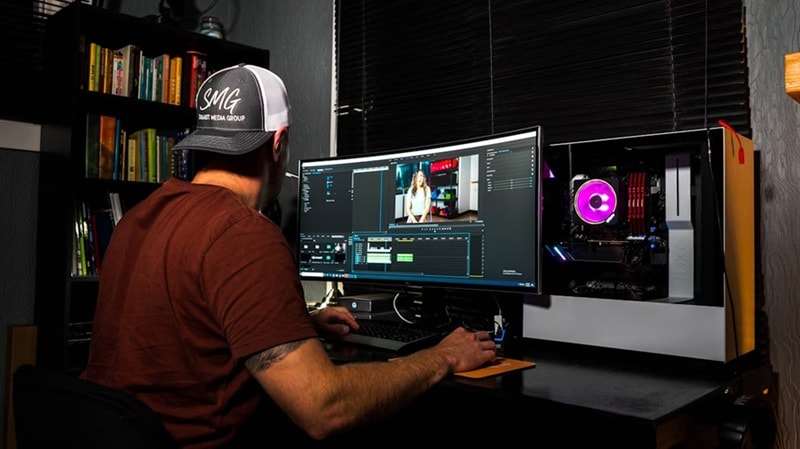
In the past, linear editing required you to redo everything that followed if you wanted to change a clip at the beginning. Modern non-linear editing software works digitally to eliminate this limitation and give creators total control.
Key Benefits of Non-Linear Video Editing
- Non-destructive editing: Your original source files remain untouched, no matter how many changes you make
- Random access: Jump to any moment in your footage instantly instead of fast-forwarding or rewinding
- Multi-track timeline: Layer multiple video clips, audio tracks, effects, and graphics simultaneously
- Real-time preview: See the results of your edits immediately as you work
- Multi-format support: Handle various file types and large formats like 4K and 8K with ease
If you compare this to traditional linear editing, it's easy to see why non-linear editing became the industry standard. This modern workflow is an essential quality for producing high-quality videos in today's fast-paced production environments.
| Feature | Linear Video Editing | Non-Linear Video Editing |
| Workflow | Analog/Tape-to-Tape, Destructive | Digital, Non-Destructive |
| Media Access | Sequential (must rewind/fast-forward) | Random Access (instant jump to any frame) |
| Editing Order | Strictly Sequential (start to finish) | Any Order (flexible arrangement) |
| Speed | Slow (tape cueing required) | Fast and Highly Efficient |
| Flexibility | Very Limited (changes require re-editing) | Maximum Flexibility (easy experimentation) |
| Undo/Redo | Very Difficult/Impossible | Instant and Unlimited |
| Multi-Track Support | Limited (1-2 tracks only) | Standard (multiple layers supported) |
| Collaboration | Difficult (physical tape transfer) | Easy (digital file sharing) |
| Hardware | Specialized analog equipment | Modern computer with powerful CPU/GPU |
|
Show more
Show less
|
||
AI Automation in Non-Linear Video Editing Software
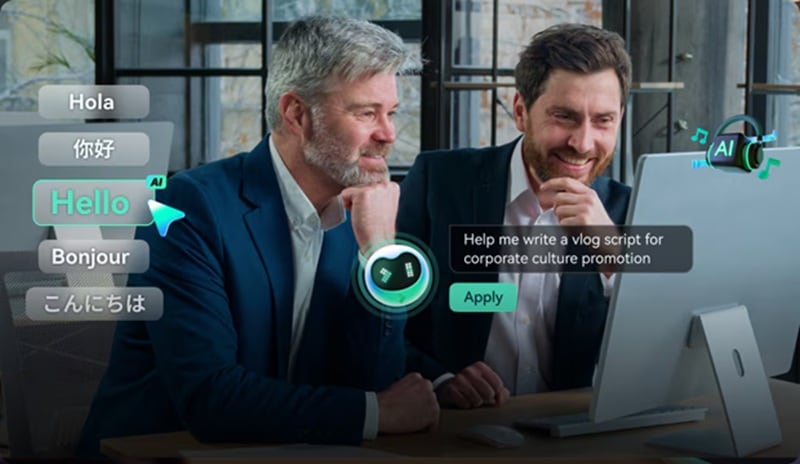
Modern professional non-linear video editing software now integrates AI-driven creative assistance to transform editing workflows. AI automation handles repetitive tasks like auto-captioning, intelligent scene detection, object tracking, and rough cutting, significantly boosting editing efficiency and productivity.
Part 2. Top Examples of Professional Non-Linear Video Editing Software
Choosing the right nonlinear video editor software (NLE) is the next critical step. The market offers many programs, but a few stand out as industry leaders and the best options for serious creators.
The following list breaks down the most popular NLE programs, highlighting what makes each unique so you can find the perfect tool to match your budget and professional goals.
| Software | Platform | Paid/Free | User Level | Key NLE Features |
| Wondershare Filmora | Windows, macOS | Freemium (Free version has watermark) | Beginner to Pro | AI-assisted editing, large effect/asset library, Motion Tracking, Multi-Track Editing. |
| Premiere Pro | Windows, macOS | Paid (Subscription) | Pro | Industry standard, deep Adobe Creative Cloud integration, advanced Multi-Cam, high-res/HDR support. |
| Final Cut Pro (FCP) | macOS | Paid | Pro | Optimized for Apple Silicon performance, integrated Motion Graphics, 360° VR editing. |
| Shotcut | Windows, macOS, Linux | Free | Beginner | Wide format support (FFmpeg), Multi-format timeline, Audio filters, Video Scopes, no watermark. |
| iMovie | macOS, iOS, iPadOS | Free (Pre-installed on Apple devices) | Beginner | Simple drag-and-drop interface, 4K support, basic Green Screen, trailer templates, easy sharing. |
| DaVinci Resolve | Windows, macOS, Linux | Free | Intermediate to Professional | Best-in-class Color Grading, Integrated Fusion (VFX) and Fairlight (Audio), advanced Collaboration (Studio version). |
| Kdenlive | Windows, macOS, Linux | Free | Intermediate | Unlimited tracks, Proxy Editing, Multi-cam editing, Keyframeable effects, Automatic Subtitle generation. |
|
Show more
Show less
|
||||
1. Wondershare Filmora
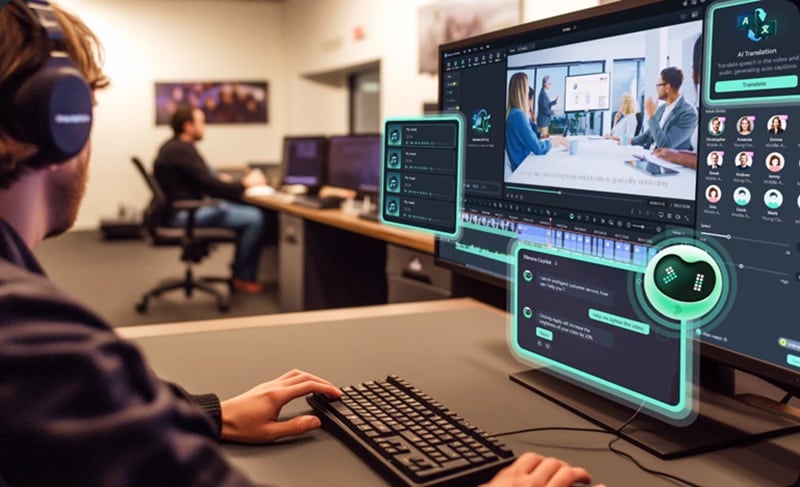
Wondershare Filmora is designed to deliver a true non-linear editing (NLE) experience built for creators who want both control and efficiency. Its multi-track timeline editing lets you layer clips, audio, effects, and transitions seamlessly, while its simple drag-and-drop setup helps you stay organized, even when working on big projects.
You can see every change instantly as you refine cuts with a lag-free real-time preview. On top of that, Filmora's AI-powered tools are what make it stand out among modern NLEs. You get to edit faster and more efficiently while still maintaining the same creative control as most professional-grade editors.
Key Features
- Intuitive Timeline: Filmora's non-linear timeline supports multiple video, audio, and graphic layers. You can move, trim, and align clips precisely with real-time playback that stays smooth even on mid-range systems.
- Creative Asset Library: Includes thousands of filters, transitions, overlays, and motion titles directly inside the editor.
- AI Editing Tools: Automate complex tasks with AI background remover, scene detection, beat synchronization, audio noise reduction, and more, while keeping full manual control for refinement.
- Advanced Control: Features keyframe animation, motion tracking, multicam editing, and color correction panels for adjusting movement, exposure, and tone precisely on every clip.
- High-Resolution Output: Supports up to 4K and 8K video formats, and export options optimized for YouTube, Instagram, and other platforms.
- Full of AI-powered features that speed up editing tasks.
- Fast rendering speed, even for 4K exports.
- Clean and modern interface that's easy to navigate.
- Offers a one-time purchase option.
- Free version includes a watermark.
- Advanced effects often require paid add-ons.
2. Adobe Premiere Pro
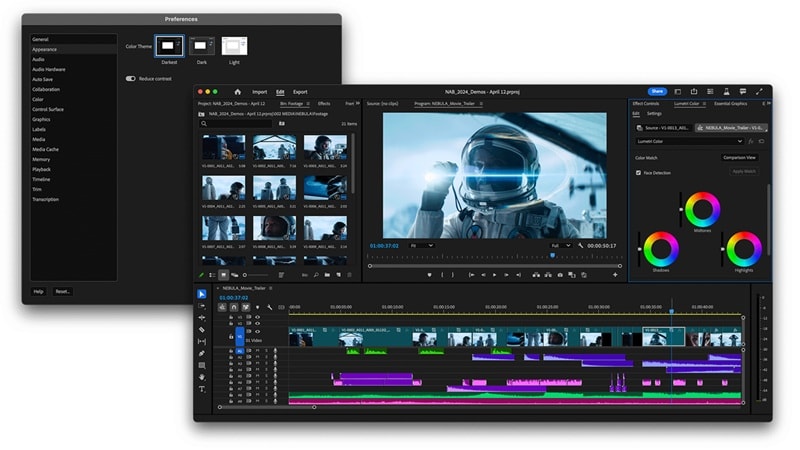
Adobe Premiere Pro is the definitive non-linear video editing platform used by professionals in film, television, and high-end video production, offering unparalleled precision and control over every aspect of a project.
Key Features
- Format Support: Robust support for 4K, 8K, and HDR footage.
- Integration: Seamless workflow with other Adobe Creative Cloud apps.
- Multi-Cam: Advanced tools for multi-camera editing.
- Customization: Highly customizable workspaces and deep audio/color controls.
- The industry-standard choice for professionals.
- Best integration with apps like After Effects and Audition.
- Precision tools suitable for any large-scale workflow.
- Expensive subscription-based model.
- Steep learning curve for new editors.
- Requires a powerful, resource-heavy computer system.
3. Final Cut Pro
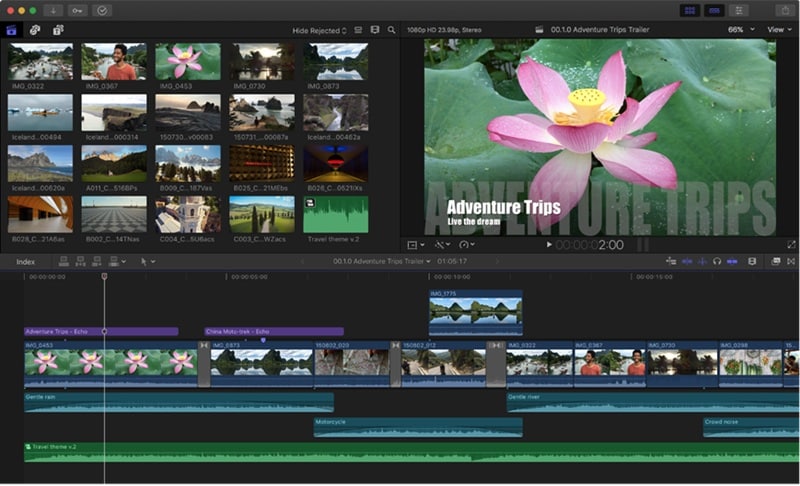
Final Cut Pro is Apple's professional Non Linear video Editor, built exclusively for macOS, known for its incredible speed, stability, and streamlined workflow, especially on Apple Silicon chips.
Key Features
- Magnetic Timeline: Unique timeline feature that simplifies clip management and prevents gaps.
- Performance: Optimized for Apple Silicon for unmatched speed and stability.
- Integrated Tools: Built-in motion graphics, audio editing, and advanced color grading.
- 360-Degree Video: Supports editing and viewing of VR and 360-degree footage.
- Exceptional performance and speed on Mac hardware.
- Simple one-time purchase price.
- Intuitive interface with a powerful system.
- Only available for macOS.
- Magnetic Timeline can be polarizing for some editors.
- Limited third-party plugin ecosystem compared to PC rivals.
4. Shotcut
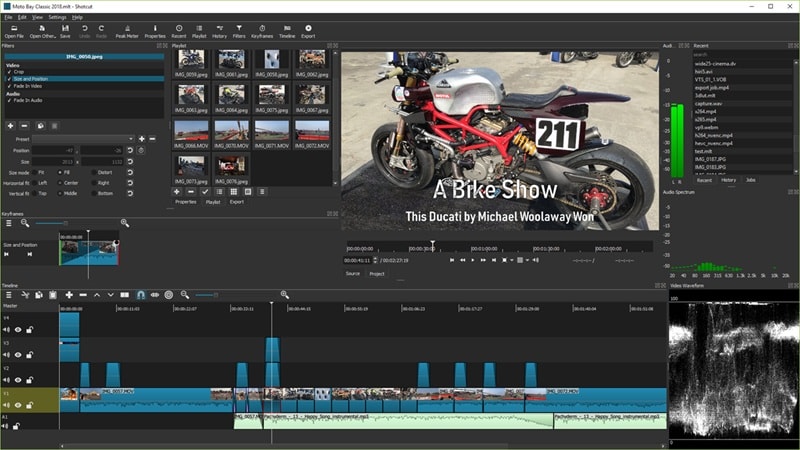
Shotcut is a completely free and open-source non linear video editor, providing a robust, cross-platform tool capable of handling professional functionality without any cost or limitations.
Key Features
- Format Support: Supports hundreds of video and audio formats (via FFmpeg).
- Cross-Platform: Available on Windows, macOS, and Linux.
- Filters: Large collection of customizable video and audio filters.
- 4K Ready: Supports resolutions up to 4K without watermarks.
- Completely free with no watermarks or ads.
- Works across all major operating systems.
- Highly flexible and customizable interface.
- Interface can look old-fashioned or clunky.
- Fewer stylish presets and transitions than commercial editors.
- Inconsistent performance on complex projects.
5. iMovie
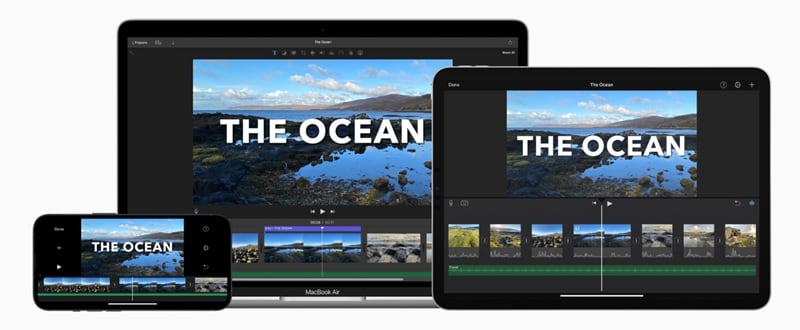
iMovie is Apple's entry-level, free non linear video Editor that comes pre-installed on all macOS and iOS devices, making it the ideal starting point for beginners and casual users.
Key Features
- Simplicity: User-friendly, drag-and-drop interface for basic editing.
- Templates: Includes trailer templates and simple green screen effects.
- Integration: Seamless integration with iOS and macOS devices.
- Output: Supports high-quality 4K resolution output.
- Completely free for all Apple users.
- Extremely quick and easy to learn.
- Excellent for creating simple, finished videos fast.
- Severely limited in advanced features.
- Supports a maximum of only two video tracks.
- Only available on Apple operating systems.
6. DaVinci Resolve
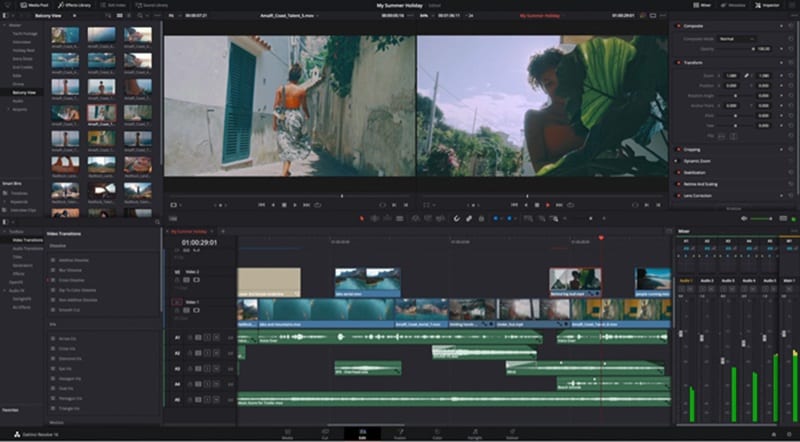
DaVinci Resolve is an incredibly powerful, all-in-one non linear video editor that combines professional editing, world-class color grading, motion graphics (Fusion), and audio post-production (Fairlight) into a single, integrated application.
Key Features
- Integrated Workflow: One application covers editing, VFX, color, and audio.
- Industry-Best Color: Widely considered the best color correction suite available.
- Collaboration: Excellent multi-user collaboration tools (even in the cloud).
- Fusion Page: Node-based visual effects and motion graphics editor.
- Incredibly robust free version with no watermarks.
- One-time purchase for the Studio version.
- Superior audio mixing and color grading tools built-in.
- Fast rendering and excellent stability.
- Very steep learning curve due to the sheer number of features and multiple pages.
- Requires a powerful GPU and significant system resources.
- Node-based compositing (Fusion) is difficult for editors used to layers.
7. Kdenlive
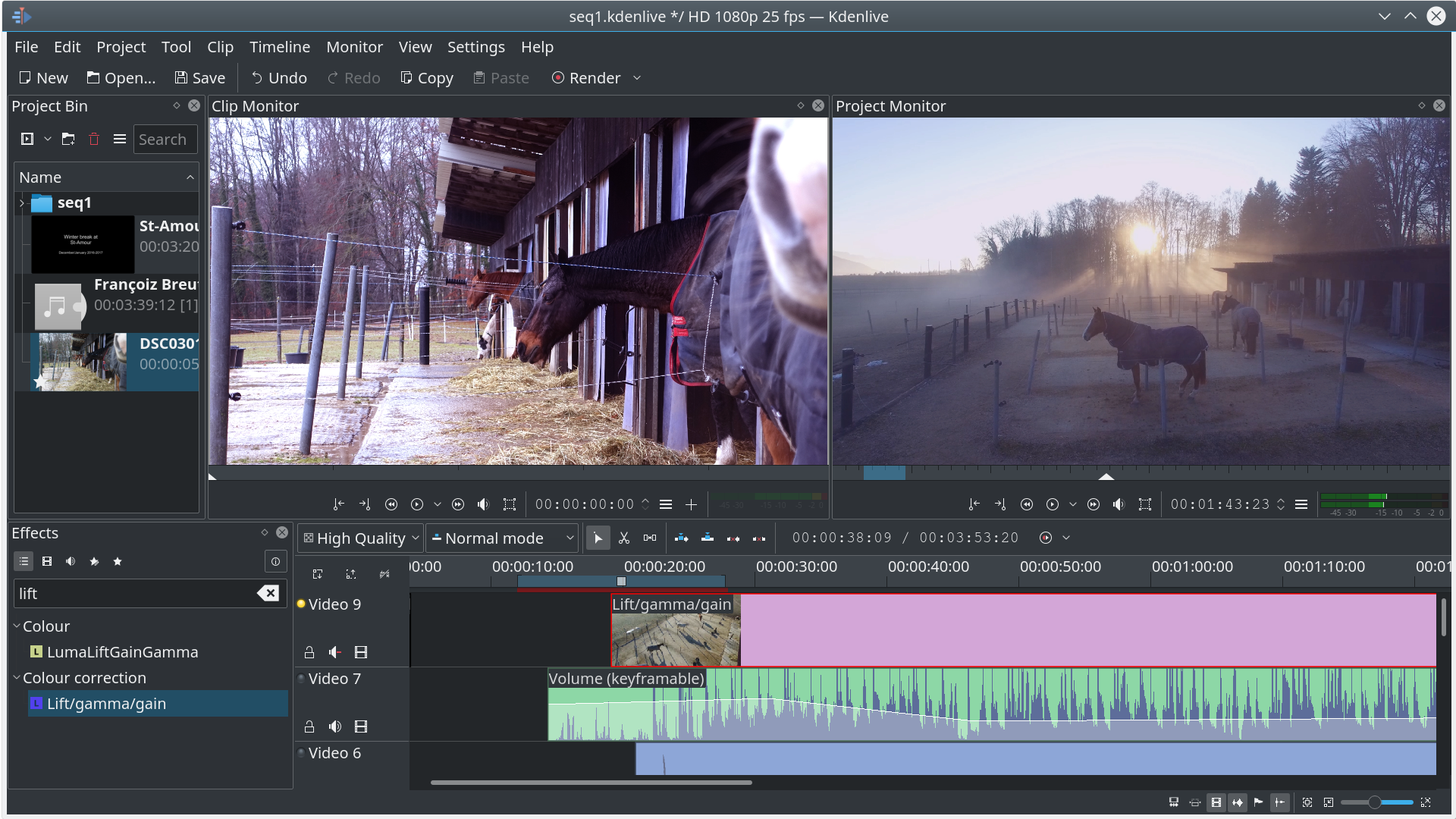
Kdenlive is a high-quality, free, and open-source Non Linear video editing software known for its customizability and professional-grade features, making it a powerful alternative on any operating system.
Key Features
- Multi-Track: Supports an unlimited number of video and audio tracks.
- Proxy Editing: Automatically creates low-resolution copies for smooth editing on slow PCs.
- Customization: Highly flexible and customizable interface/workspace.
- Community-Driven: Benefits from rapid development and regular updates.
- Totally free and open-source.
- Robust multi-track capabilities for complex projects.
- Available on Windows, macOS, and Linux.
- Supports advanced features like automatic subtitle generation.
- Interfaces can be less polished and sometimes less stable than commercial software.
- Can have a steeper learning curve than simple editors.
- Requires reliance on community support and tutorials.
Part 3. What to Look For in Professional-Grade NLE Software
Every NLE software is built for different types of users and production needs. While entry-level programs work well for basic cutting, professional-grade NLE video editing software must handle complex demands and meet industry standards. Here are the key criteria to consider when making your choice.
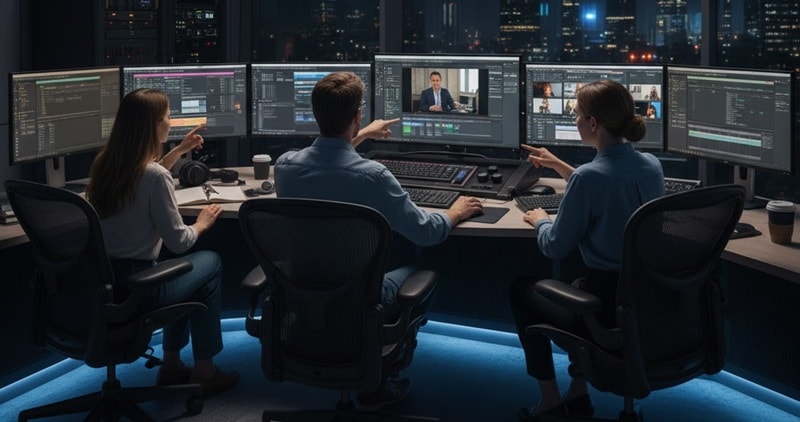
Core Editing Features
A professional NLE video editing software must provide precision and control far beyond simple trimming, with the ability to handle large, complex projects efficiently, such as:
- Unlimited Tracks - Capacity for virtually unlimited video, audio, and effects layers.
- Precision Tools - Advanced keyframing for smooth motion and effects control.
- Multi-Cam Editing - Dedicated tools to synchronize and edit footage from multiple camera angles.
- Integrated Finishing - Robust tools for advanced color grading and audio mixing.
Most of the NLEs here meet these standards. But DaVinci Resolve and Premiere Pro especially offer the deepest control and finishing tools in this area. Filmora also combines these essentials in a simpler interface.
But if you only need to handle everyday editing or create quick videos, software like iMovie, Shotcut, and Kdenlive is enough as a reliable, no-cost tool for basic cutting, trimming, and layering tasks.
AI-Powered Features and Automation
Modern professional nonlinear video editor applications use Artificial Intelligence to automate tedious tasks and help editors save time and focus on creative storytelling. Premiere Pro is powered by Adobe Sensei for auto-reframing and captions, while DaVinci Resolve runs on the Neural Engine for advanced tracking and face recognition.
If you think AI automation is something you need in your workflow, Filmora is one of the best tools to start with. It offers more AI-driven editing options than most software. Some of the standout features include:
- Auto-Captioning - Automatic transcription of dialogue to generate subtitles quickly.
- Smart Reframing - Automatically adjust video for different aspect ratios (e.g., vertical social media).
- Object Tracking - AI-powered tools to automatically follow a subject or object in the frame.
- Scene Detection - Automatically break down long clips into individual scenes.
Plugin and Format Support
The best professional software is future-proof and flexible, ensuring it can handle any file type and integrate specialized functionality.
- Broad Format Support - Seamlessly ingest and export a wide range of high-resolution codecs and file types.
- Third-Party Plugins - Extensive ecosystem for adding specialized visual effects, film emulation, and custom tools.
- High-Resolution Ready - Native support for 4K, 6K, 8K, and HDR footage.
- Customization - Tailor the software's interface and capabilities to specific professional needs.
In this case, entry-level editors like iMovie might not offer much flexibility for plugin integration or advanced codec handling. However, Filmora, Premiere Pro, DaVinci Resolve, and Final Cut Pro provide extensive format support and compatibility with professional plugin ecosystems, on top of their native ability.
Author's Verdict:
- Filmora is perfect for creators who want professional-quality results with minimal setup.
- DaVinci Resolve and Premiere Pro are built for professionals who need precision color, audio, and effects control.
- Final Cut Pro remains a top choice for Mac users seeking power and speed in one purchase, while iMovie serves as a free, lighter alternative built into macOS and iOS devices.
- Kdenlive and Shotcut deliver surprising professional capability for free, especially if you prefer open-source flexibility.
Conclusion
Non-Linear Editing (NLE) has fundamentally transformed video production, replacing the limitations of sequential tape-based workflows with unprecedented creative flexibility and speed. Modern nonlinear video editing software provides editors with non-destructive control, multi-track layering, and instant access to any clip, making it the standard for professional work today.
As the industry evolves, non-linear video editing platforms are rapidly integrating AI-powered features and automation to help editors tackle repetitive tasks. This streamlines post-production and accelerates content creation. These next-generation, AI-assisted tools represent the future of editing and mark the beginning of a new, highly efficient creative workflow.

